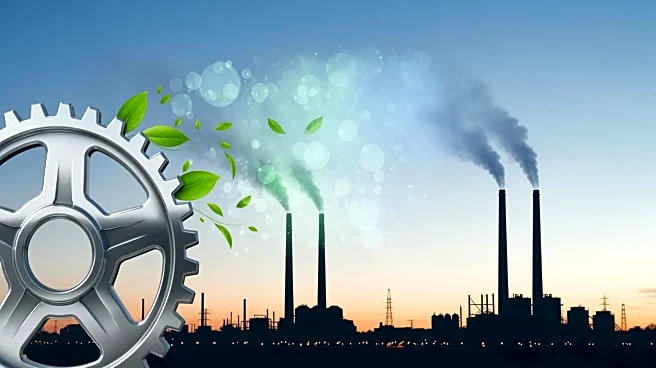What's Happening?
Azerbaijan has unveiled plans to decarbonize its industry by 2035, focusing on replacing gas boilers with electric boilers and high-temperature heat pumps. This initiative is part of Azerbaijan's updated Nationally Determined Contribution (NDC 3.0), which
aims to reduce emissions in sectors heavily reliant on high-emission fuel combustion. The plan includes electrification of equipment and machinery, particularly in the food and beverage, chemicals, and metals industries. The industry sector, which contributes significantly to Azerbaijan's non-oil and gas GDP, generated 8.9 MtCO2eq of emissions in 2022. The government is prioritizing decarbonization to meet emissions targets, with significant investments planned in the chemical industry and non-metallic minerals.
Why It's Important?
The decarbonization plan is crucial for Azerbaijan as it seeks to balance economic growth with environmental sustainability. The industry sector is a major source of economic growth and employment, contributing up to 25% of the country's non-oil and gas GDP. However, this growth has led to increased greenhouse gas emissions, making decarbonization essential to meet international climate commitments. The plan's focus on electrification and energy efficiency could serve as a model for other countries with similar industrial profiles. Successful implementation could reduce emissions significantly, improve air quality, and enhance Azerbaijan's global standing in environmental stewardship.
What's Next?
Azerbaijan's government will need to invest in high-cost technologies and infrastructure to achieve its decarbonization goals. This includes developing renewable energy sources, modernizing grid infrastructure, and upgrading industrial processes. The implementation of leakage detection and repair technologies in the oil and gas sector is also planned to reduce methane emissions. The government will likely continue to support energy efficiency programs and establish more industrial parks to concentrate assets and facilitate decarbonization efforts. These steps will require collaboration between the government, private sector, and international partners.
Beyond the Headlines
The decarbonization initiative could have broader implications for Azerbaijan's economic and social landscape. By investing in renewable energy and modernizing industrial processes, Azerbaijan could attract foreign investment and enhance its competitiveness in global markets. The focus on energy efficiency and electrification may also lead to job creation in new sectors, requiring workforce retraining and education. Additionally, the plan could improve public health by reducing air pollution and fostering a cleaner environment. These changes could contribute to a more sustainable and resilient economy in the long term.
















